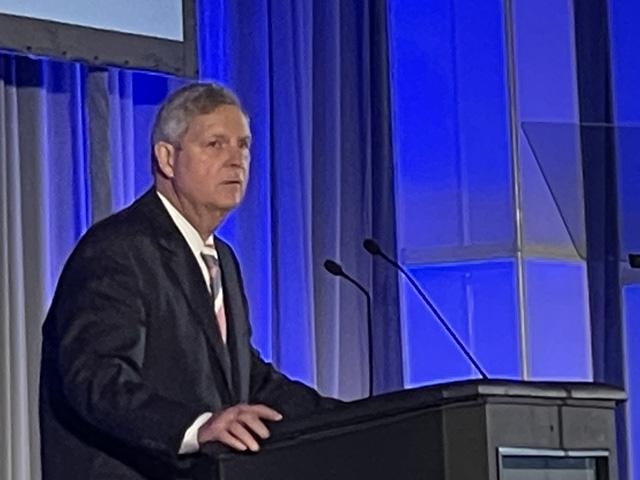E15 in Limbo Just Months Before Summer
States' E15 Petition to Take Effect in 2025; National Waivers Likely in 2024
SAN DIEGO (DTN) -- The Biden administration is set to approve the petition of eight Midwest states to sell E15 permanently year-round but with one caveat -- implementation is expected to be delayed by one year to 2025.
Speaking to ethanol producers and farmers at the National Ethanol Conference in San Diego on Tuesday, U.S. Secretary of Agriculture Tom Vilsack essentially confirmed a media report to that effect this week.
"I'm confident that in 2025 we will have E15 across the country and this summer we will see waivers as we have seen the past couple of summers," Vilsack said.
Earlier in the day an ethanol industry official said the administration needs to act.
"By law, EPA had 90 days to approve," said Geoff Cooper, president and CEO of the Renewable Fuels Association. Cooper made his remarks as part of a speech on the state of the industry to start the day.
"Just a few months away from summer and no one in these Midwest states know whether they'll have it available. We're calling on EPA to immediately act on it, so governors in these states can move forward."
On April 28, 2022, governors in eight states requested a change allowed by the Clean Air Act to reject the use of the 1-psi waiver for E10, a 10% ethanol-blended gasoline. The action would clear the way for permanent, year-round E15 sales in the states. E15 is a blend of up to 15% ethanol and 85% gasoline.
On Tuesday, Reuters reported the Biden administration was set to approve the states' request with a delay in implementation by one year to 2025.
Cooper said allowing E15 year-round in the eight states would reduce emissions and "level the playing field" for E15.
P[L1] D[0x0] M[300x250] OOP[F] ADUNIT[] T[]
The rule would result in applying the same volatility limitation to both E15 and E10 -- essentially putting E10 and E15 on the same footing in those states. The eight states include Illinois, Iowa, Minnesota, Missouri, Nebraska, Ohio, South Dakota, and Wisconsin.
The ethanol industry could overcome E15 fits and starts once and for all, Cooper said, if Congress passes legislation to make year-round availability permanent across the country.
Sens. Amy Klobuchar, D-Minn., and Deb Fischer, R-Neb., in March 2023 reintroduced the Consumer and Fuel Retailer Choice Act of 2023.
Cooper said during his state of the ethanol industry address that the industry had a rather "quiet" year in 2023.
The ethanol industry saw more stability in the marketplace, Cooper said, crude oil prices were less volatile, farmers produced a record corn crop with a record yield, and the EPA finalized three years of renewable volume obligations.
However, he said 2024 can be expected to be "consequential" and "pivotal" to ethanol's future.
That includes whether tax credits for sustainable aviation fuel will be properly implemented, and whether ethanol will see a level playing field with electric vehicles through carbon-reduction standards or whether mandates will rule the day.
There are other questions. Will the industry have permanent year-round E15? What happens to the Renewable Fuel Standard past 2025? Will carbon capture, utilization and storage projects be allowed to move forward? How will the 2024 elections affect the industry?
"Electrification will begin to erode liquid-fuel consumption over the long term," Cooper said.
Expanding the E15 market gives ethanol a chance for modest growth, he said, and "helps us hold the line on demand."
Vilsack said the ethanol industry has a "friend" in the Biden administration.
"E15 is now available in 30 states, just three years ago it was 23 states," Vilsack said.
"We understand and appreciate the importance of expanding the infrastructure to make those higher blends available. Want to save consumers money, invest in biofuels. We're going to continue to see the expansion of the capacity to sell higher blends."
Cooper called out the Biden administration's approach to mandating the use of electric vehicles as one-sided.
"EPA treats EVs as zero-vehicles and ignores emissions upstream," he said.
"We are not opposed to electric vehicles. Let's be fair and honest in how we account for GHG emissions impacts. Let the marketplace determine the best ways to meet reductions."
Cooper said some states including California are putting their "finger on the scale" for EVs. California will require EV sales to make up about 30% of all vehicle sales in the state by 2026, while other states are taking steps to adopt the California EV mandate.
Todd Neeley can be reached at todd.neeley@dtn.com
Follow him on X, formerly known as Twitter @DTNeeley
(c) Copyright 2024 DTN, LLC. All rights reserved.




